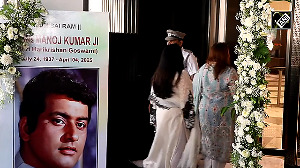Tactical systems such as main battle tank Arjun, light combat aircraft Tejas, a family of radars, electronic warfare systems, sonars, torpedoes, armaments and missiles have been successfully developed in the country and many of them are being delivered to the armed forces. The recent success of the DRDO (Defence Research and Development Organisation) in the launch of interceptor missile and Agni-III has taken our country into the elite club of a few developed nations.
I am glad to know that the DRDO has achieved an appreciable level of self-reliance in nuclear, biological and chemical defence technologies and a large quantity of these products are already being delivered to the defence forces. Life support technologies and products developed by the DRDO have significantly enhanced the health and operational efficiency of our soldiers operating in extremes of environmental and operational conditions. These include high altitudes over the Himalayas, the deserts of the western borders, and underwater, aerospace and low intensity conflict environments.
I would like to congratulate and thank the scientists and staff of the DRDO for the 50 years of dedicated service to the nation. A golden jubilee is an important milestone in the history of any organisation such as the DRDO. It provides an opportunity to take stock and showcase the accomplishments as well as to analyse the shortcomings to find ways to overcome them.
A criticism against DRDO has been that there has been 'time and cost overruns' in many projects. I fully appreciate that a developing country like India, which did not even have a car of its own design till recently, ventured to develop complex systems such as MBT (main battle tank). These efforts are to be seen in an ambience where industry support in prototype development or system integration was meagre and academic support for seeding new science and technologies inadequate.
I am confident that the DRDO has built the tacit knowledge and capability for system integration within the country. When they venture to make next version of the weapon systems/platforms in future, such delays must be minimised with proper project management and strong review mechanisms.
India must strengthen its indigenous research and design and manufacturing capabilities. The government of India is fully committed to enhance the self-reliance index through indigenous design, development and production. The international market forces certainly will offer resistance in our endeavour.
The DRDO, the defence services and industries, both public and private, will have to work as a team with a stakeholder spirit towards the goal and face the challenge in global competition and make our defence industries vibrant and contribute to increased acquisitions from within India.
Private sector industries should strengthen their R&D capability and quality assurance in manufacturing, thereby contributing in this mission of self-reliance. Innovation is the key for development. The DRDO as well as our industries should promote innovation at the national level.
The DRDO may also look at the potential of the offset policy to leverage new technologies during the acquisition process. Joint ventures in R&D with other countries may increase in a global economy.
Our government is committed to providing ample incentives to make scientific profession more attractive and improve the quality of life of our scientists in their workplace and well as their living ambience. Science and technology is the key for development and hence our government is fully committed to promote it in a big way during the 11th Plan. The DRDO will also be strengthened as part of this plan.
Excerpted from Defence Minister A K Antony speech at the golden jubilee celebration of DRDO on January 9





 © 2025
© 2025